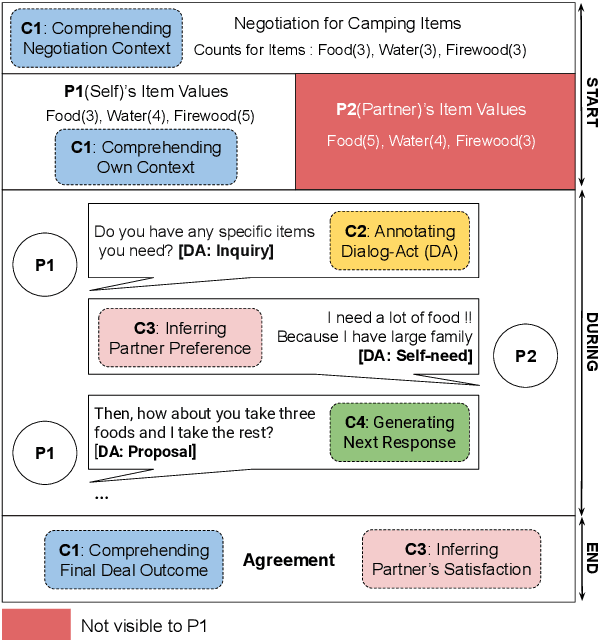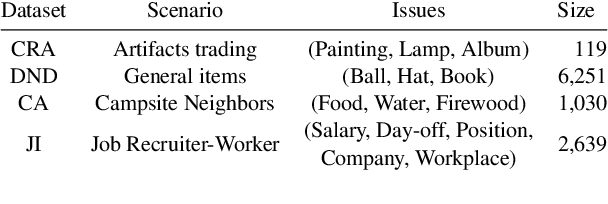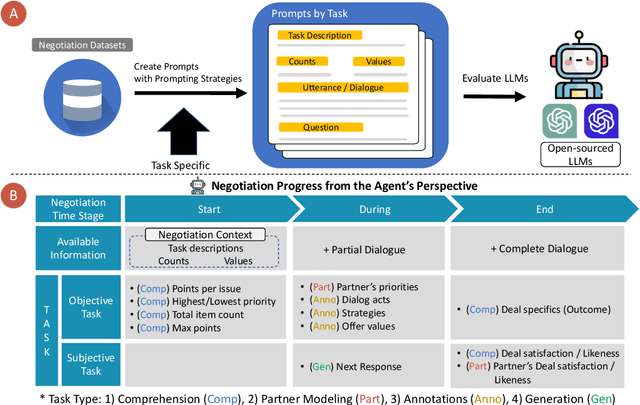Deuksin Kwon
Personality Expression Across Contexts: Linguistic and Behavioral Variation in LLM Agents
Feb 01, 2026Abstract:Large Language Models (LLMs) can be conditioned with explicit personality prompts, yet their behavioral realization often varies depending on context. This study examines how identical personality prompts lead to distinct linguistic, behavioral, and emotional outcomes across four conversational settings: ice-breaking, negotiation, group decision, and empathy tasks. Results show that contextual cues systematically influence both personality expression and emotional tone, suggesting that the same traits are expressed differently depending on social and affective demands. This raises an important question for LLM-based dialogue agents: whether such variations reflect inconsistency or context-sensitive adaptation akin to human behavior. Viewed through the lens of Whole Trait Theory, these findings highlight that LLMs exhibit context-sensitive rather than fixed personality expression, adapting flexibly to social interaction goals and affective conditions.
ASTRA: A Negotiation Agent with Adaptive and Strategic Reasoning through Action in Dynamic Offer Optimization
Mar 10, 2025Abstract:Negotiation requires dynamically balancing self-interest and cooperation to maximize one's own utility. Yet, existing agents struggle due to bounded rationality in human data, low adaptability to counterpart behavior, and limited strategic reasoning. To address this, we introduce principle-driven negotiation agents, powered by ASTRA, a novel framework for turn-level offer optimization grounded in two core principles: opponent modeling and Tit-for-Tat reciprocity. ASTRA operates in three stages: (1) interpreting counterpart behavior, (2) optimizing counteroffers via a linear programming (LP) solver, and (3) selecting offers based on negotiation tactics and the partner's acceptance probability. Through simulations and human evaluations, our agent effectively adapts to an opponent's shifting stance and achieves favorable outcomes through enhanced adaptability and strategic reasoning. Beyond improving negotiation performance, it also serves as a powerful coaching tool, offering interpretable strategic feedback and optimal offer recommendations.
Are LLMs Effective Negotiators? Systematic Evaluation of the Multifaceted Capabilities of LLMs in Negotiation Dialogues
Feb 21, 2024



Abstract:A successful negotiation demands a deep comprehension of the conversation context, Theory-of-Mind (ToM) skills to infer the partner's motives, as well as strategic reasoning and effective communication, making it challenging for automated systems. Given the remarkable performance of LLMs across a variety of NLP tasks, in this work, we aim to understand how LLMs can advance different aspects of negotiation research, ranging from designing dialogue systems to providing pedagogical feedback and scaling up data collection practices. To this end, we devise a methodology to analyze the multifaceted capabilities of LLMs across diverse dialogue scenarios covering all the time stages of a typical negotiation interaction. Our analysis adds to the increasing evidence for the superiority of GPT-4 across various tasks while also providing insights into specific tasks that remain difficult for LLMs. For instance, the models correlate poorly with human players when making subjective assessments about the negotiation dialogues and often struggle to generate responses that are contextually appropriate as well as strategically advantageous.
WHAT, WHEN, and HOW to Ground: Designing User Persona-Aware Conversational Agents for Engaging Dialogue
Jun 21, 2023



Abstract:This paper presents a method for building a personalized open-domain dialogue system to address the $\textit{WWH}$ ($\textit{WHAT}$, $\textit{WHEN}$, and $\textit{HOW}$) problem for natural response generation in a commercial setting, where personalized dialogue responses are heavily interleaved with casual response turns. The proposed approach involves weighted dataset blending, negative persona information augmentation methods, and the design of personalized conversation datasets to address the challenges of $\textit{WWH}$ in personalized, open-domain dialogue systems. Our work effectively balances dialogue fluency and tendency to ground, while also introducing a response-type label to improve the controllability and explainability of the grounded responses. The combination of these methods leads to more fluent conversations, as evidenced by subjective human evaluations as well as objective evaluations.
 Add to Chrome
Add to Chrome Add to Firefox
Add to Firefox Add to Edge
Add to Edge